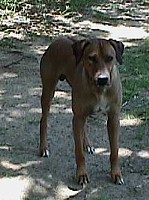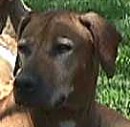Things to Know Before You
Buy a Rhodesian Ridgeback
Although Rhodesian Ridgebacks are still a relatively rare breed (about
2,000 AKC registrations per year, compared to >50,000 for breeds
such as
Rottweiler, Doberman, Labrador Retriever), there are quite a few
reputable
breeders who are members of the Rhodesian Ridgeback Club of the United
States (RRCUS), and subscribe to the RRCUS Code
of Ethics.
 The Code includes several important
provisions that are intended
to assure the continued improvement of the Rhodesian Ridgeback breed,
and
also to protect puppy buyers. These provisions include the following:
The Code includes several important
provisions that are intended
to assure the continued improvement of the Rhodesian Ridgeback breed,
and
also to protect puppy buyers. These provisions include the following:
-
An
ethical breeder does not
engage in the overbreeding of stock for profit without regard for
quality
and health of the dogs.
An
ethical breeder studies
and weighs the faults and attributes of a stud and bitch, becoming well
informed of those considered genetic (inheritable). An ethical breeder
is sincere in the intent of not breeding dogs with defects that are
likely
to cause impairment of the health of the dogs or offspring.
An
ethical breeder informs
his/her buyers about the dermoid sinus and how to detect it.
li>
An
ethical breeder is always
available to buyers for consultation even after completion of a sale.
/li>
An
ethical breeder will x-ray
the hips of all potential breeding stock and will use only dogs
certified
clear of hip dysplasia for breeding.
An
ethical breeder will obtain
an OFA (Orthopedic Foundation for Animals) certification of clear hips,
or an OFA preliminary x-ray and will provide a copy of this certificate
to a puppy buyer, on request.
Avoid
buying puppies
from pet shops. These dogs are typically
produced wholesale
by `puppy farms' where the sole purpose is producing a salable product.
Although pet shop puppies usually have AKC registration papers, you
should
know that this registration implies absolutely no guarantee. Puppy
farms
are in the business of wholesale production and typically pay no
attention
to possible inheritable problems like the dermoid sinus, hip dysplasia,
and temperament.
ALL BREEDERS ARE NOT CREATED EQUAL!
Often you will see Rhodesian Ridgeback puppy ads in
the newspaper.
Sometimes these ads are placed by reputable breeders. However, often
these
ads are placed by `backyard breeders.' These are people who have
acquired
a dog and one or more bitches and crank out litters of puppies for the
sole purpose of profit. You can spot one of these backyard breeders in
several ways:
If
the seller has trouble remembering
details of the pedigree of the puppies for sale, beware.
Breeders who are breeding with the goal of improving the breed will be
very familiar with the pedigree of their puppies, and will be able to
tell
you the AKC names of sire and dam, grandparents, and usually even
great-grandparents.
People who are just in the business of selling puppies for a profit
will
often `not remember' these important facts.
If
the seller does not know
what a dermoid sinus is, beware. This is a
common genetic
problem in the breed. The condition is present at birth and
considerable
experience is required to detect it. A dermoid sinus can be removed
surgically,
but the operation is rather major and costly. It is a genetic condition
and is likely to pop up in any litter.
If
the seller tells you that
`hip dysplasia is not a problem in Ridgebacks' or that it `is not a
problem
in my line,' beware. Although the incidence
of hip dysplasia
in Ridgebacks is much lower than in many other breeds, it is still
about
3%, meaning that the chance of a given puppy developing the condition
is
one in thirty! The probability of a puppy having hip dysplasia is much
reduced if both parents and all four grandparents have been x-rayed and
certified clear of the condition by the Orthopedic Foundation for
Animals.
If
the seller is not willing
to provide a written health guarantee, beware.
Most ethical
breeders do provide written guarantees that cover genetic conditions
like
the dermoid sinus, hip dysplasia, etc. There are enough reputable
breeders
that you can certainly find a guaranteed puppy, so there is no need to
take one with no strings attached and then find in a year that you have
a $300 vet bill to remove a dermoid.
If
the seller tells you that
the puppy `doesn't have a ridge yet, but it will come in later,' beware.
A certain number of Ridgebacks are born without ridges. This is due to
a genetic fault and reputable breeders are trying to eliminate this
characteristic
from the breed gene pool. You should know that the ridge is fully
visible,
in its complete form, at birth. A puppy that does not have a ridge will
never have a ridge.
If
the seller tells you that
he/she `doesn't make a distinction between show-quality and pet-quality
puppies, beware. The purpose of dog shows is
to obtain independent
judgement from a number of qualified judges that a dog is a good
representative
of the breed, as measured by the written breed
standard. Breeders who are sincerely trying to improve the
Rhodesian
Ridgeback breed want to have their very best puppies exhibited in dog
shows,
and hope that their best animals will achieve American Kennel Club
championships.
Back yard breeders often tell potential customers that `show dogs' are
inbred and have genetic problems that will result in poor health. The
truth
is exactly the opposite. When you buy a dog whose sire and dam are AKC
champions (as evidenced by `Ch' before the name on their names on the
registration
application), you know that at least three different judges (and
usually
many more) have measured these animals against the breed standard and
awarded
championship credit.
 Most reputable breeders make a distinction
between `show-quality'
and `pet-quality' and price the dogs appropriately (show-quality dogs
are
usually 30-50% more expensive than pet-quality dogs). Show-quality
means
that the dog has no obvious faults that would make it difficult or
impossible
for the dog to achieve a championship. With Ridgebacks, the most common
faults are a defective ridge (too short, less than or more than two
crowns)
and excessive white. Other faults that might be present are kinked tail
or imperfect bite. Faults of this sort are usually cosmetic rather than
functional and do not effect the health of the dog. Remember that the
breeder
is making a decision that a puppy is `show quality' at a very young age
(usually seven or eight weeks of age). It takes a fair amount of
experience
to make these kinds of predictions with any confidence, which is a
compelling
reason to buy from a breeder who either has considerable experience in
the breed, or who has a network of friends who can serve as
consultants.
Most reputable breeders make a distinction
between `show-quality'
and `pet-quality' and price the dogs appropriately (show-quality dogs
are
usually 30-50% more expensive than pet-quality dogs). Show-quality
means
that the dog has no obvious faults that would make it difficult or
impossible
for the dog to achieve a championship. With Ridgebacks, the most common
faults are a defective ridge (too short, less than or more than two
crowns)
and excessive white. Other faults that might be present are kinked tail
or imperfect bite. Faults of this sort are usually cosmetic rather than
functional and do not effect the health of the dog. Remember that the
breeder
is making a decision that a puppy is `show quality' at a very young age
(usually seven or eight weeks of age). It takes a fair amount of
experience
to make these kinds of predictions with any confidence, which is a
compelling
reason to buy from a breeder who either has considerable experience in
the breed, or who has a network of friends who can serve as
consultants.
Written by Clayton Heathcock, a
RRCUS member. Permission is
hereby extended to anyone who wishes to copy and distribute this essay.
 The Code includes several important
provisions that are intended
to assure the continued improvement of the Rhodesian Ridgeback breed,
and
also to protect puppy buyers. These provisions include the following:
The Code includes several important
provisions that are intended
to assure the continued improvement of the Rhodesian Ridgeback breed,
and
also to protect puppy buyers. These provisions include the following: The Code includes several important
provisions that are intended
to assure the continued improvement of the Rhodesian Ridgeback breed,
and
also to protect puppy buyers. These provisions include the following:
The Code includes several important
provisions that are intended
to assure the continued improvement of the Rhodesian Ridgeback breed,
and
also to protect puppy buyers. These provisions include the following: Most reputable breeders make a distinction
between `show-quality'
and `pet-quality' and price the dogs appropriately (show-quality dogs
are
usually 30-50% more expensive than pet-quality dogs). Show-quality
means
that the dog has no obvious faults that would make it difficult or
impossible
for the dog to achieve a championship. With Ridgebacks, the most common
faults are a defective ridge (too short, less than or more than two
crowns)
and excessive white. Other faults that might be present are kinked tail
or imperfect bite. Faults of this sort are usually cosmetic rather than
functional and do not effect the health of the dog. Remember that the
breeder
is making a decision that a puppy is `show quality' at a very young age
(usually seven or eight weeks of age). It takes a fair amount of
experience
to make these kinds of predictions with any confidence, which is a
compelling
reason to buy from a breeder who either has considerable experience in
the breed, or who has a network of friends who can serve as
consultants.
Most reputable breeders make a distinction
between `show-quality'
and `pet-quality' and price the dogs appropriately (show-quality dogs
are
usually 30-50% more expensive than pet-quality dogs). Show-quality
means
that the dog has no obvious faults that would make it difficult or
impossible
for the dog to achieve a championship. With Ridgebacks, the most common
faults are a defective ridge (too short, less than or more than two
crowns)
and excessive white. Other faults that might be present are kinked tail
or imperfect bite. Faults of this sort are usually cosmetic rather than
functional and do not effect the health of the dog. Remember that the
breeder
is making a decision that a puppy is `show quality' at a very young age
(usually seven or eight weeks of age). It takes a fair amount of
experience
to make these kinds of predictions with any confidence, which is a
compelling
reason to buy from a breeder who either has considerable experience in
the breed, or who has a network of friends who can serve as
consultants.